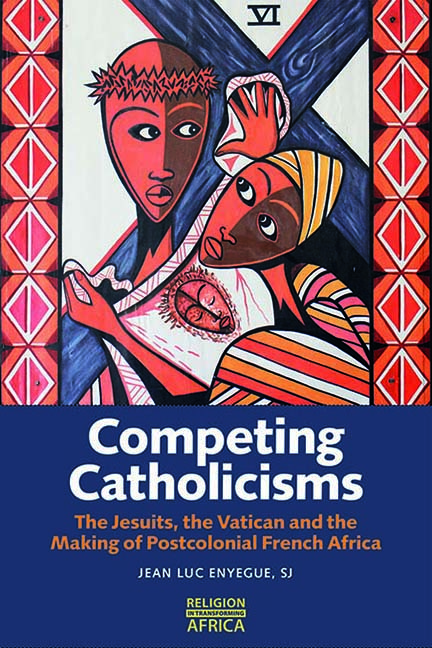Book contents
- Frontmatter
- Dedication
- Contents
- List of Illustrations
- Acknowledgements
- List of Abbreviations
- Glossary
- Chronology of Jesuit Missions in Chad and Cameroon
- Introduction: The End of the Jesuit Mission in Africa?
- Part I The Jesuit Project in West Africa: French Catholicism and Colonialism in Chad, 1935–58
- Part II The Outward Mission: Education and Competing Catholicisms
- Part III The Postcolonial Mission and Catholicity: From Chad to Cameroon, 1962–78
- Conclusion
- Bibliography
- Index
- Previously published titles in the series
1 - Era of Confusion: The Vatican’s or France’s Wider Agenda? 1935–46
Published online by Cambridge University Press: 16 July 2022
- Frontmatter
- Dedication
- Contents
- List of Illustrations
- Acknowledgements
- List of Abbreviations
- Glossary
- Chronology of Jesuit Missions in Chad and Cameroon
- Introduction: The End of the Jesuit Mission in Africa?
- Part I The Jesuit Project in West Africa: French Catholicism and Colonialism in Chad, 1935–58
- Part II The Outward Mission: Education and Competing Catholicisms
- Part III The Postcolonial Mission and Catholicity: From Chad to Cameroon, 1962–78
- Conclusion
- Bibliography
- Index
- Previously published titles in the series
Summary
A mission to evangelise or a mission to civilise? In Paris, in 1935, Jesuit Father Frédéric de Bélinay met Lieutenant Mazodier. The officer had just spent two years in Chad as part of the colonial expedition. He lamented not having seen a single priest during his two years in Chad. De Bélinay was so moved by the story that he volunteered to go to Chad, alone, as an evangeliser. Mazodier's experience reminded de Bélinay that vast portions of humanity were still untouched by the gospel. He had a duty to evangelise them. The primary concern that motivated de Bélinay, as evidenced in his correspondence, was the fate of the French soldiers who, like Mazodier, had been serving the empire. Like these soldiers, de Bélinay's mission in Chad included protecting French interests in Central Africa. He seemed not at all concerned by the Vatican's call to Africanise the Church. The mission to evangelise was a mission to Frenchify.
Himself a veteran of the First World War, de Bélinay is said to have travelled 3,400km by camel. He visited troops from Fort-Archambault to Borkou, near the Tibesti mountains on the Libyan frontier. His Jesuit superiors confirmed what was initially a personal initiative three years later, in 1938. That year, de Bélinay settled in Fort-Lamy (today's N’Djamena, the capital of Chad). He spent most of his time visiting the soldiers, although little is known about his actual work with them. Yet, as this chapter shows, de Bélinay earnestly mobilised France's Gaullism to make Chad a strategic priority. Muslims were on the move southwards and the Americans were coming. Losing Chad to any of them, he believed, would be catastrophic for France and for stability in Central Africa.
This chapter focuses on these early years of the mission, from the exploratory period of de Bélinay starting in 1935 to the mission's formal approval by the Vatican's Congregation for the Evangelisation of Peoples in 1946. It describes the initial steps of de Bélinay in Chad as a time of great confusion in the empire out of which emerged a steady process of Frenchification. Father de Bélinay was in Chad to evangelise. Yet, he carried with him the hopes and anxieties of his homeland.
- Type
- Chapter
- Information
- Competing CatholicismsThe Jesuits, the Vatican and the Making of Postcolonial French Africa, pp. 30 - 56Publisher: Boydell & BrewerPrint publication year: 2022



